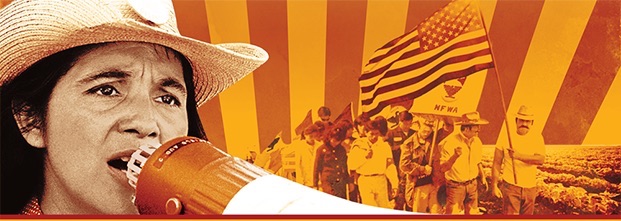VANCOUVER LATIN AMERICAN FILM FESTIVAL
“Dolores”
USA – 2017
When was the last time you attended a film and, as the closing credits began to roll, the audience spontaneously erupted with clapping and cheering? That was the response of theatre goers following the screening of the documentary film, “Dolores”, at the Cinematheque.
Written and directed by Peter Bratt, the story of the life of Dolores Huerta is told through a narrator, news clips and interviews, many with Huerta herself, who is now 87 years old. Dolores Huerta became interested in social justice issues at a very young age, after hearing a talk by an also very young Martin Luther King. She met Cesar Chavez, a young Latino who was trying to work for the rights of the migrant fruit workers in the California fields, and became his partner in meeting, organizing and transforming the lives of the farm workers by staging a protracted and successful boycott of grapes in the United States. She was tireless in her efforts, meeting people in their homes, speaking wherever she could, insisting on moving forward even in the face of daunting adversity and developing strategies which worked. When marches and strikes were no longer having the desired effect on the fruit growers, who owned the land, Huerta and Chavez organized the grape boycott, which forced the landowners to negotiate fairly with the workers.
One of the strengths of the film is its honesty. Huerta had two husbands, a third partner and eleven children. Many of the children participated in interviews for the film and poignantly described feeling abandoned by their mother. She was never at home and they had to fend for themselves from a very young age. Huerta agreed that this was true but that her passion for the cause was more compelling than anything else to her. Late in the film, the role of her children takes on an entirely new dimension.
It is clear from interviews and news footage that Dolores Huerta had at least as much, if not more, influence on the successes of the migrant workers as did Cesar Chavez, but her name and her contributions are almost unknown. She was a leader during a time where men were political leaders, men organized unions and men had voice. But it was she who worked with Gloria Steinem and Coretta King, and she who was a friend of Bobby Kennedy.
With the release of “Dolores” a much needed chapter can be added to the history books. Her tireless work on behalf of the poor and neglected was often punctuated by her trademark slogan, “Sí, se puede!” (Yes, we can), which Barack Obama borrowed, and thanked her for, during his campaign for the presidency of the United States. She continues to work, through her Foundation, for the rights of people, especially women, everywhere.
Judy Robb





